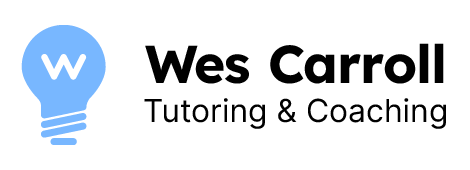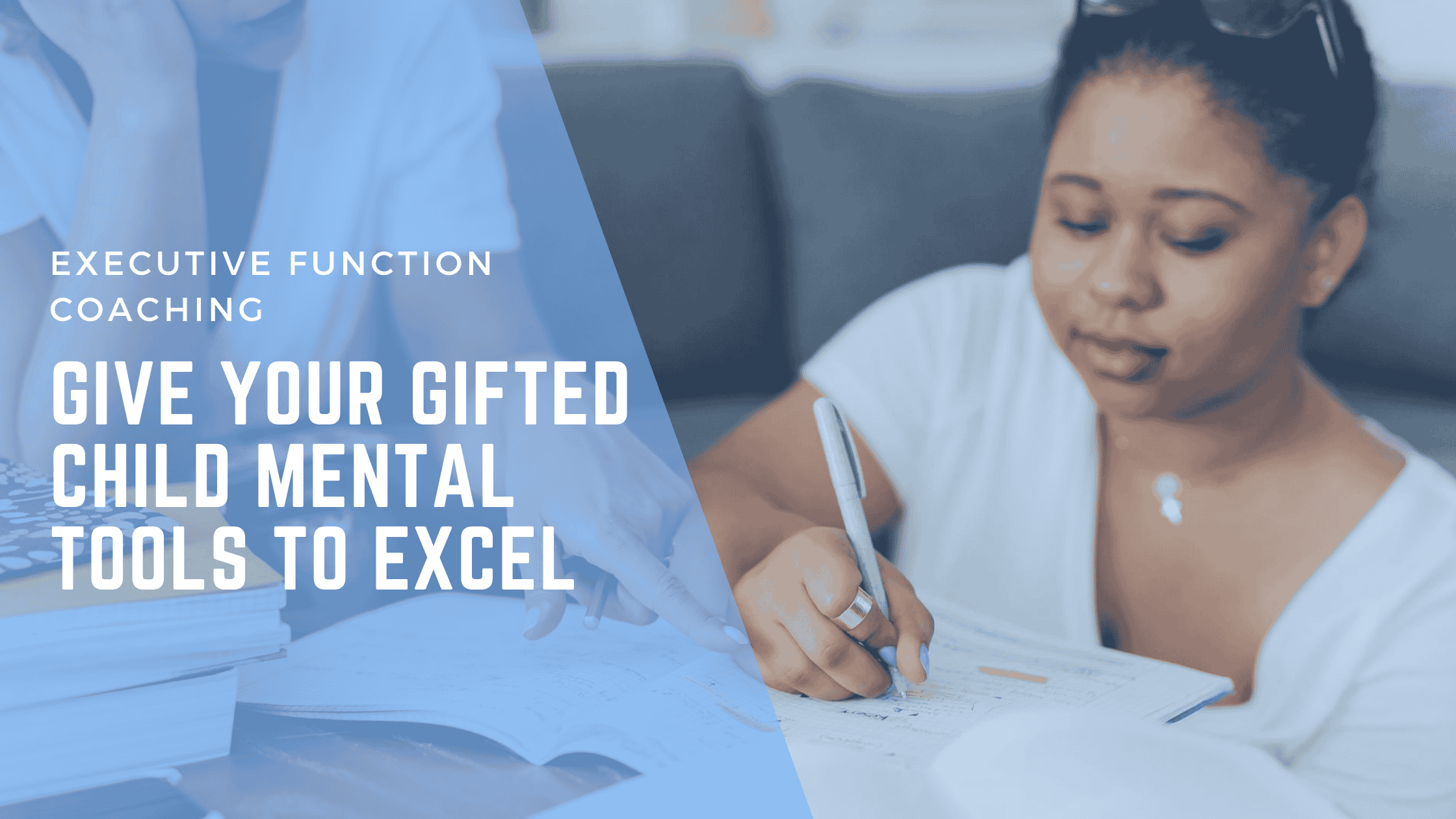Executive function coaching is like upgrading the control panel in your gifted child’s brain. It helps them master planning, organization, getting work done, and managing emotions—those essential skills that supercharge their intellect and achieve academic success with ease. If your bright child is struggling despite their brilliance, this could be the key to unlocking their full potential.
In this article, you’ll find out:
- Why high-achieving kids sometimes struggle more than their peers.
- How executive function coaching transforms potential into results.
- The difference between executive function coaching and tutoring.
- What to look for in a coach for your gifted child.
- Why even the smartest kids need skills to maximize their intelligence.
Your gifted child is struggling—but why?
Even the brightest students can hit roadblocks when the ‘what’ of schoolwork comes easily but the ‘how’—planning, organizing, getting things done—proves challenging. This gap often highlights underdeveloped executive functions.
Traditional classrooms rarely meet the unique needs of high-achieving students. Without sufficient challenge, boredom sets in, making any existing struggles with executive functions even more apparent.
Understanding executive functions
Your child’s brilliant mind holds the potential for great achievements. But like a high-performance engine, raw intellectual power needs precise calibration and control to reach its full potential. Executive functions provide that control. They are essential skills that enable your child to plan effectively, organize their thoughts and workspace, manage time wisely, and maintain focus in the face of challenges. When these functions are underdeveloped, even gifted students can struggle to translate their potential into consistent academic and personal success.
Executive functions encompass a range of skills vital for success in school and life:
- Planning and prioritizing: Setting goals, breaking down tasks into manageable steps, and anticipating challenges.
- Organization: Developing systems for managing materials, information, and schedules effectively.
- Time management: Understanding how long tasks will take, setting deadlines, and prioritizing tasks to meet those deadlines.
- Task initiation: Starting work promptly and overcoming procrastination.
- Focus and attention: Resisting distractions, sustaining concentration, and switching between tasks smoothly.
- Working memory: Holding and manipulating information for problem-solving and following instructions.
- Self-control: Managing emotions, staying motivated in the face of setbacks, and resisting impulses that interfere with their goals.
- Flexibility: Adapting to change, shifting plans when necessary, and considering new information or perspectives.
Why are these skills so crucial?
With these skills in hand, your child will have the foundation—the wisdom, tools, and willpower—to pursue the worthwhile things in life. Without them, well…
Think of it this way: Even a brilliant kid who cannot initiate a project, get organized, or summon the discipline to stay on task will consistently underperform compared to a less intelligent kid who independently studies after school and solves problems before bed.
The plight of the high-achiever
When we think of struggling students, gifted or high-achieving kids don’t usually come to mind. Yet, these students are often faced with specific and sometimes misinterpreted challenges in the traditional educational environment.
For example:
Insufficient challenges
When schoolwork is too simple or monotonous, a smart student can easily be turned off. Without the need to develop strong study habits, planning, and time management, their executive functions will remain underdeveloped despite their intellectual abilities.
Boredom
When the pace of the class is too slow, high-achieving students get bored. This boredom can manifest as disruptive behavior, daydreaming, or a general sense of apathy towards schoolwork.
How would you feel if you always knew the answers to class exercises before everyone else? Or if you had to wait endlessly for your classmates to catch up when you were ready to move on to more complex subjects?
Being misunderstood
Gifted children often have curiosities and mindsets that are unlike their peers’. It can be socially isolating when others around them don’t appreciate their passion for learning or find their way of thinking unusual.
Besides, teachers who are not aware of the essence of giftedness might misinterpret a student’s quickness to grasp concepts as not needing support at all, when in reality, the student might lack the executive function skills to independently apply these concepts effectively.
When students with high academic performance sail through their early school years without putting in much effort, they don’t get the opportunity to develop their executive functions. With the increase in the demands and complexities of the curriculum, the underdeveloped executive function skills suddenly become a big hurdle to their academic success.
Suddenly getting a poor grade on a test or forgetting a major assignment can be deeply confusing and frustrating, both for the student and their parents. They might question their intelligence or feel like they’re “letting everyone down” despite having the intellectual capacity to excel. This kind of experience can erode their confidence and motivation, leading to further underachievement.
Benefits of executive function coaching
Executive function coaching gets to the heart of assisting high-potential students to reach their full potential. It is a long-term investment in strengthening fundamental habits that underpin learning, going beyond the current school year or even a specific subject
How executive function coaching is different from tutoring
Unlike tutoring, which focuses on mastering particular content knowledge (for example, improving math skills or understanding historical events) executive function coaching focuses on building the fundamental skills necessary for independent learning. Here’s the difference:
Tutoring
Tutoring is aimed at fixing gaps in your child’s knowledge.
If your child doesn’t know how to, for instance, apply the rules of integration to find the area under a curve, you can get a tutor to teach them what they need to know. And your kid is very smart. An example or two and some explanation from an excellent tutor are all they need to grasp the topic. They will flow through any problems the tutor places in their way, as long as it’s not too much more complex than the examples. Then it’s on to the next topic.
That’s all the job description expects.
This is where most gifted kids drop their pencils. They understand the topic, and that’s enough. In a test or exam a few months later, they simply have to think very hard for a while and they’ll triumph. But they don’t have the time to think that hard on a test, so even though they know this problem, they won’t perform as well as they should.
Executive function coaching
Now, suppose your child worked with a tutor and reviewed examples in class. Afterward, even though homework wasn’t required, they practiced independently by finding and solving two more problems on the same topic each day.
Suppose your child did this every day in the intervening weeks or months to a test or exam, including measures that reduce the stress that even the thought of beginning something like this promises. There would be no stopping them.
Suppose your kid had the will and discipline to apply an appropriate form of this practice to every aspect of their life. This is something executive function coaching can make a reality.
Specific benefits for high-achieving students
Improved time management skills
Students learn to develop practical schedules, set deadlines, break down the big tasks into smaller ones, and prioritize the workload properly. That means they can handle multiple assignments and extracurricular activities without feeling overwhelmed.
Efficient organizational systems
Coaches assist students in developing strategies for organizing their papers, notes, and assignments. This lessens the anxiety of lost homework or the constant scrambling before exams.
Strategic planning abilities
Students develop strategic planning skills, anticipate possible difficulties, and make backup plans in case things go wrong. This develops them into self-directed learners who can confront challenges with courage.
Increased task initiation and follow-through
Coaches help students overcome delays and focus. This gives them a chance to start projects on time, complete them without getting distracted, and feel accomplished.
Stress reduction
When a student feels like they are in control of their workload and can see the deadlines and difficulties coming, it reduces anxiety levels in a great way. This can not only help students academically but also contribute to their emotional well-being.
Executive function coaching is not just for grades
The influence of executive function coaching on a student’s academic achievement is not limited to the classroom. Strong executive function skills help students to succeed in college and their careers, and in building lives that are not only fulfilling but also self-directed.
What to look for in an executive function coach
Selecting the right executive function coach for your gifted child is essential. Not every coach may be the perfect match, especially for high-achieving or gifted students. Here’s what to keep in mind during your search:
Understanding of giftedness
A trainer who is familiar with working with gifted students is well aware of the distinctive challenges and advantages of high intelligence.
They understand that lacking organizational skills or procrastinating is not a matter of laziness but a possible indication of executive functions not being fully developed.
They must be able to tailor the coaching methods to match your child’s high intellectual level.
Age-appropriate methods
Executive functions develop progressively during childhood and adolescence. An effective coach adapts their approach to your child’s age and maturity. What suits middle school students might be too simplistic or boring for high schoolers.
A great executive function coach should have a wide range of age-appropriate strategies that will help your child acquire skills without feeling like they are being patronized.
Ability to connect
Making a meaningful connection with your child is very important. A coach has to be intellectually capable of engaging high-achieving students, meeting them where they are, and challenging them to think critically about their learning process.
This level of connection builds trust and creates a positive environment where growth and change will blossom.
Look beyond the credentials
Besides experience and specialization, pay attention to your intuition when meeting potential coaches. Ask yourself:
- Is this coach sincerely interested in assisting my child’s growth?
- Can they simplify complicated terms and ideas in a way my child can grasp?
- Is my child comfortable talking to them?
Selecting an executive function coach is a personalized decision. This emphasis allows you to find a partner who can help open the way for your child’s full potential and facilitate long-term academic success and personal growth.
Now, let’s talk about how we at Wes Carroll Tutoring and Coaching (WCTC) help high-achievers find their stride…
WCTC’s approach to executive function coaching
At WCTC, we believe that building robust executive functions is not just for better grades, although it definitely is a nice bonus. Our philosophy is about assisting high-achieving students to develop the attributes of self-directed, resilient learners who can make it in the classroom and life in general.
Our executive function coaching method
- We identify the problem
The process starts with us understanding your child’s specific challenges and tailoring approaches to help them develop stronger planning, organization, and focus habits.
- Practical strategies
We don’t just discuss executive functions in the abstract. We supply students with tangible techniques and structures for time management, organization, task planning, and overcoming procrastination. We show them how to use these strategies in a way that fits their thinking style and works for them individually.
- Real-world application
Exam grades matter, but we look at the bigger picture. Our coaching provides students with the necessary skills, such as self-advocacy, prioritizing tasks, and stress management. These skills not only prepare them for the rigors of higher education but also for successfully managing the complexities of a fulfilling career.
- Collaborative partnership
Success in executive function coaching is a team effort. We collaborate with parents to keep you updated with your child’s progress, provide you with home-based support, and learn your overall goals for their development.
Preparing for the future
Our approach isn’t a quick fix. With patience and cooperative collaboration, students can master the executive function skills needed for ongoing academic success and better manage their workload.
They will be more self-assured, in charge of their own learning, and intrinsically driven by the motivation that sustains long-term success.
How to get started
If you’re ready to help your bright child build the executive function skills that will unlock their full potential, here’s how to get started with WCTC:
- Contact us
Contact us through our website’s contact form. You’ll have the opportunity to share a bit about your child’s specific challenges and what you hope to achieve through executive function coaching.
- Initial consultation
We’ll schedule a free phone consultation to examine your child’s needs in more detail. We’ll discuss their strengths, areas for growth, and concerns. This consultation will help us determine if our services are a good match for your family.
- Assessment
If we decide to move forward, the next step is a more in-depth assessment of your child’s executive functions. This could involve a combination of interviews, questionnaires, and direct observation of work habits. The assessment helps us create a highly personalized coaching plan for your child.
- Coaching sessions
Our coaching sessions, offered in-person or virtually, are tailored to your child’s age and needs. We’ll work directly with them to build essential executive function skills, support them with current schoolwork, and equip them with strategies for lasting academic success.
- Stay informed with regular updates
We believe in transparent communication with parents. Expect regular progress updates and open discussions on how you can reinforce skills at home, as well as strategies to approach any challenges that may arise.
What to expect in the first sessions
Our early sessions prioritize building trust and understanding with your child. We’ll focus on:
- Learning about their interests and passions
- Understanding their perspective on school challenges
- Identifying their particular areas of strength and growth
- Introducing new concepts related to executive function in a way they can connect with
Empowering Your Child for Lifelong Success!
Taking this step is a significant investment in your child’s future. We will provide transformative executive function coaching that empowers your child to reach new heights in their academic and personal life.
Contact us today to take the first step on this journey.
Conclusion
Your child’s incredible intellect is just part of the equation. Executive functions are the key to ensuring that their full potential isn’t hampered by underdeveloped planning skills, disorganization, or procrastination that can undermine their efforts.
Think back to the analogy of a high-powered car without proper steering or brakes. Even with a powerful engine, it can’t reach its intended destination. Executive function coaching helps your child take control of their own journey, guiding them towards success in school and paving the way for a fulfilling future where they can fully realize their ambitions.
More than grades
Executive function skills aren’t just about improving GPA. They’re about helping your child develop a sense of agency over their own learning, become resilient problem-solvers, and build confidence in their ability to handle challenges both inside and outside the classroom. When they can focus, plan, organize, and manage their workload effectively, they reduce their stress levels and unlock their true potential to excel.
An investment with lifelong returns
Choosing executive function coaching is a decision that goes far beyond the next test or report card. It’s an investment in your child’s overall development as a learner, a leader, and an individual who will continue to thrive in a world that demands adaptability and self-direction.
If you recognize your gifted child is struggling despite their intellectual abilities, there’s a path forward. Reach out to Wes Carroll Tutoring and Coaching and discover how executive function coaching can transform your child’s experience with school and give them skills that will last a lifetime.




0 Comments